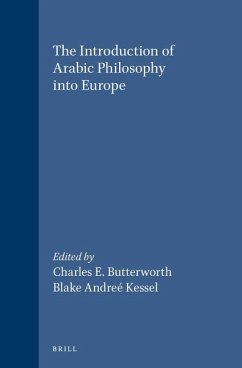The contributors to this volume are noted scholars from Belgium, France, Germany, Great Britain, Hungary, Morocco, Poland, the Soviet Union, and Spain. Each has stepped somewhat outside of his or her usual academic interest to consider how the writings of a particular Arab philosopher or of a group of Arab philosophers were introduced into a particular European university. Their essays identify the European professor or scholar who first introduced the works of an Arab philosopher into his university, speak about the works themselves, and explore what prompted the original European interest in the particular philosopher or philosophers. Thus, by explaining how medieval European universities first approached Arab philosophy, these papers contribute to the growing interest in the curriculum and general life of those important institutions.
Bitte wählen Sie Ihr Anliegen aus.
Rechnungen
Retourenschein anfordern
Bestellstatus
Storno



